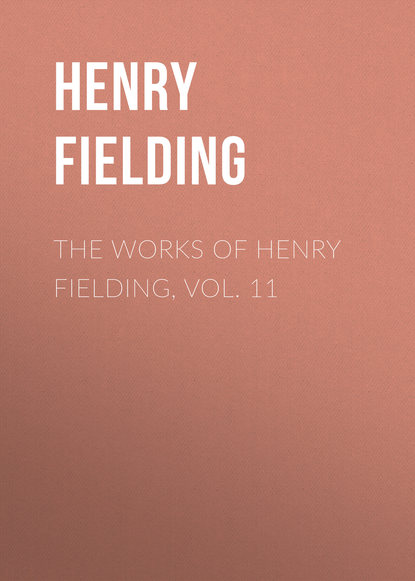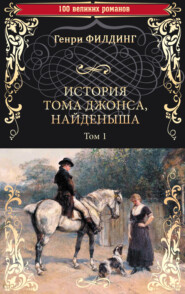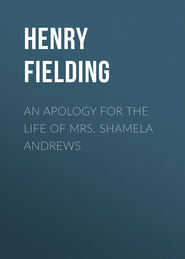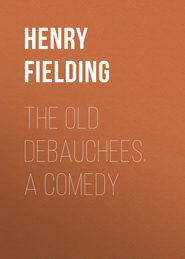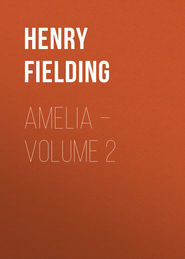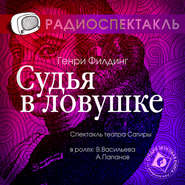По всем вопросам обращайтесь на: info@litportal.ru
(©) 2003-2024.
✖
The Works of Henry Fielding, vol. 11
Настройки чтения
Размер шрифта
Высота строк
Поля
“The first thing we are taught is the countenance miserable. This indeed nature makes much easier to some than others; but there are none who cannot accomplish it, if they begin early enough in youth, and before the muscles are grown too stubborn.
“The second thing is the voice lamentable. In this qualification too, nature must have her share in producing the most consummate excellence: however, art will here, as in every other instance, go a great way with industry and application, even without the assistance of genius, especially if the student begins young.
“There are many other instructions, but these are the most considerable. The women are taught one practice more than the men, for they are instructed in the art of crying, that is, to have their tears ready on all occasions: but this is attained very easily by most. Some indeed arrive at the utmost perfection in this art with incredible facility.
“No profession requires a deeper insight into human nature than the beggar’s. Their knowledge of the passions of men is so extensive, that I have often thought it would be of no little service to a politician to have his education among them. Nay, there is a much greater analogy between these two characters than is imagined; for both concur in their first and grand principle, it being equally their business to delude and impose on mankind. It must be confessed that they differ widely in the degree of advantage which they make by their deceit; for, whereas the beggar is contented with a little, the politician leaves but a little behind.
“A very great English philosopher hath remarked our policy, in taking care never to address any one with a title inferior to what he really claims. My father was of the same opinion; for I remember when I was a boy, the pope happening to pass by, I tended him with ‘Pray, sir;’ ‘For God’s sake, sir;’ ‘For the Lord’s sake, sir;’ – To which he answered gravely, ‘Sirrah, sirrah, you ought to be whipt for taking the Lord’s name in vain;’ and in vain it was indeed, for he gave me nothing. My father, overhearing this, took his advice, and whipt me very severely. While I was under correction I promised often never to take the Lord’s name in vain any more. My father then said, ‘Child, I do not whip you for taking his name in vain; I whip you for not calling the pope his holiness.’
“If all men were so wise and good to follow the clergy’s example, the nuisance of beggars would soon be removed. I do not remember to have been above twice relieved by them during my whole state of beggary. Once was by a very well-looking man, who gave me a small piece of silver, and declared he had given me more than he had left himself; the other was by a spruce young fellow, who had that very day first put on his robes, whom I attended with ‘Pray, reverend sir, good reverend sir, consider your cloth.’ He answered, ‘I do, child, consider my office, and I hope all our cloth do the same.’ He then threw down some money, and strutted off with great dignity.
“With the women I had one general formulary: ‘Sweet pretty lady,’ ‘God bless your ladyship,’ ‘God bless your handsome face.’ This generally succeeded; but I observed the uglier the woman was, the surer I was of success.
“It was a constant maxim among us, that the greater retinue any one travelled with the less expectation we might promise ourselves from them; but whenever we saw a vehicle with a single or no servant we imagined our booty sure, and were seldom deceived.
“We observed great difference introduced by time and circumstance in the same person; for instance, a losing gamester is sometimes generous, but from a winner you will as easily obtain his soul as a single groat. A lawyer travelling from his country seat to his clients at Rome, and a physician going to visit a patient, were always worth asking; but the same on their return were (according to our cant phrase) untouchable.
“The most general, and indeed the truest, maxim among us was, that those who possessed the least were always the readiest to give. The chief art of a beggar-man is, therefore, to discern the rich from the poor, which, though it be only distinguishing substance from shadow, is by no means attainable without a pretty good capacity and a vast degree of attention; for these two are eternally industrious in endeavouring to counterfeit each other. In this deceit the poor man is more heartily in earnest to deceive you than the rich, who, amidst all the emblems of poverty which he puts on, still permits some mark of his wealth to strike the eye. Thus, while his apparel is not worth a groat, his finger wears a ring of value, or his pocket a gold watch. In a word, he seems rather to affect poverty to insult than impose on you. Now the poor man, on the contrary, is very sincere in his desire of passing for rich; but the eagerness of this desire hurries him to over-act his part, and he betrays himself as one who is drunk by his overacted sobriety. Thus, instead of being attended by one servant well mounted, he will have two; and, not being able to purchase or maintain a second horse of value, one of his servants at least is mounted on a hired rascallion. He is not contented to go plain and neat in his cloathes; he therefore claps on some tawdry ornament, and what he adds to the fineness of his vestment he detracts from the fineness of his linnen. Without descending into more minute particulars, I believe I may assert it as an axiom of indubitable truth, that whoever shews you he is either in himself or his equipage as gaudy as he can, convinces you he is more so than he can afford. Now, whenever a man’s expence exceeds his income, he is indifferent in the degree; we had therefore nothing more to do with such than to flatter them with their wealth and splendour, and were always certain of success.
“There is, indeed, one kind of rich man who is commonly more liberal, namely, where riches surprize him, as it were, in the midst of poverty and distress, the consequence of which is, I own, sometimes excessive avarice, but oftener extreme prodigality. I remember one of these who, having received a pretty large sum of money, gave me, when I begged an obolus, a whole talent; on which his friend having reproved him, he answered, with an oath, ‘Why not? Have I not fifty left?’
“The life of a beggar, if men estimated things by their real essence, and not by their outward false appearance, would be, perhaps, a more desirable situation than any of those which ambition persuades us, with such difficulty, danger, and often villany, to aspire to. The wants of a beggar are commonly as chimerical as the abundance of a nobleman; for besides vanity, which a judicious beggar will always apply to with wonderful efficacy, there are in reality very few natures so hardened as not to compassionate poverty and distress, when the predominancy of some other passion doth not prevent them.
“There is one happiness which attends money got with ease, namely, that it is never hoarded; otherwise, as we have frequent opportunities of growing rich, that canker care might prey upon our quiet, as it doth on others; but our money stock we spend as fast as we acquire it; usually at least, for I speak not without exception; thus it gives us mirth only, and no trouble. Indeed, the luxury of our lives might introduce diseases, did not our daily exercise prevent them. This gives us an appetite and relish for our dainties, and at the same time an antidote against the evil effects which sloth, united with luxury, induces on the habit of a human body. Our women we enjoy with ecstasies at least equal to what the greatest men feel in their embraces. I can, I am assured, say of myself, that no mortal could reap more perfect happiness from the tender passion than my fortune had decreed me. I married a charming young woman for love; she was the daughter of a neighbouring beggar, who, with an improvidence too often seen, spent a very large income which he procured by his profession, so that he was able to give her no fortune down; however, at his death he left her a very well accustomed begging-hut, situated on the side of a steep hill, where travellers could not immediately escape from us, and a garden adjoining, being the twenty-eighth part of an acre, well planted. She made the best of wives, bore me nineteen children, and never failed, unless on her lying-in, which generally lasted three days, to get my supper ready against my return home in an evening; this being my favourite meal, and at which I, as well as my whole family, greatly enjoyed ourselves; the principal subject of our discourse being generally the boons we had that day obtained, on which occasions, laughing at the folly of the donors made no inconsiderable part of the entertainment; for, whatever might be their motive for giving, we constantly imputed our success to our having flattered their vanity, or overreached their understanding.
“But perhaps I have dwelt too long on this character; I shall conclude, therefore, with telling you that after a life of 102 years’ continuance, during all which I had never known any sickness or infirmity but that which old age necessarily induced, I at last, without the least pain, went out like the snuff of a candle.
“Minos, having heard my history, bid me compute, if I could, how many lies I had told in my life. As we are here, by a certain fated necessity, obliged to confine ourselves to truth, I answered, I believed about 50,000,000. He then replied, with a frown, ‘Can such a wretch conceive any hopes of entering Elysium?’ I immediately turned about, and, upon the whole, was rejoiced at his not calling me back.”
Chapter xx
Julian performs the part of a statesman
“IT was now my fortune to be born of a German princess; but a man-midwife, pulling my head off in delivering my mother, put a speedy end to my princely life.
“Spirits who end their lives before they are at the age of five years are immediately ordered into other bodies; and it was now my fortune to perform several infancies before I could again entitle myself to an examination of Minos.
“At length I was destined once more to play a considerable part on the stage. I was born in England, in the reign of Ethelred II. My father’s name was Ulnoth: he was earl or thane of Sussex. I was afterwards known by the name of earl Goodwin, and began to make a considerable figure in the world in the time of Harold Harefoot, whom I procured to be made king of Wessex, or the West Saxons, in prejudice of Hardicanute, whose mother Emma endeavoured afterwards to set another of her sons on the throne; but I circumvented her, and, communicating her design to the king, at the same time acquainted him with a project which I had formed for the murder of these two young princes. Emma had sent for these her sons from Normandy, with the king’s leave, whom she had deceived by her religious behaviour, and pretended neglect of all worldly affairs; but I prevailed with Harold to invite these princes to his court, and put them to death. The prudent mother sent only Alfred, retaining Edward to herself, as she suspected my ill designs, and thought I should not venture to execute them on one of her sons, while she secured the other; but she was deceived, for I had no sooner Alfred in my possession than I caused him to be conducted to Ely, where I ordered his eyes to be put out, and afterwards to be confined in a monastery.
“This was one of those cruel expedients which great men satisfy themselves well in executing, by concluding them to be necessary to the service of their prince, who is the support of their ambition.
“Edward, the other son of Emma, escaped again to Normandy; whence, after the death of Harold and Hardicanute, he made no scruple of applying to my protection and favour, though he had before prosecuted me with all the vengeance he was able, for the murder of his brother; but in all great affairs private relation must yield to public interest. Having therefore concluded very advantageous terms for myself with him, I made no scruple of patronizing his cause, and soon placed him on the throne. Nor did I conceive the least apprehension from his resentment, as I knew my power was too great for him to encounter.
“Among other stipulated conditions, one was to marry my daughter Editha. This Edward consented to with great reluctance, and I had afterwards no reason to be pleased with it; for it raised her, who had been my favourite child, to such an opinion of greatness, that, instead of paying me the usual respect, she frequently threw in my teeth (as often at least as I gave her any admonition), that she was now a queen, and that the character and title of father merged in that of subject. This behaviour, however, did not cure me of my affection towards her, nor lessen the uneasiness which I afterwards bore on Edward’s dismissing her from his bed.
“One thing which principally induced me to labour the promotion of Edward was the simplicity or weakness of that prince, under whom I promised myself absolute dominion under another name. Nor did this opinion deceive me; for, during his whole reign, my administration was in the highest degree despotic: I had everything of royalty but the outward ensigns; no man ever applying for a place, or any kind of preferment, but to me only. A circumstance which, as it greatly enriched my coffers, so it no less pampered my ambition, and satisfied my vanity with a numerous attendance; and I had the pleasure of seeing those who only bowed to the king prostrating themselves before me.
“Edward the Confessor, or St Edward, as some have called him, in derision I suppose, being a very silly fellow, had all the faults incident, and almost inseparable, to fools. He married my daughter Editha from his fear of disobliging me; and afterwards, out of hatred to me, refused even to consummate his marriage, though she was one of the most beautiful women of her age. He was likewise guilty of the basest ingratitude to his mother (a vice to which fools are chiefly, if not only, liable); and, in return for her endeavours to procure him a throne in his youth, confined her in a loathsome prison in her old age. This, it is true, he did by my advice; but as to her walking over nine ploughshares red-hot, and giving nine manors, when she had not one in her possession, there is not a syllable of veracity in it.
“The first great perplexity I fell into was on the account of my son Swane, who had deflowered the abbess of Leon, since called Leominster, in Herefordshire. After this fact he retired into Denmark, whence he sent to me to obtain his pardon. The king at first refused it, being moved thereto, as I afterwards found, by some churchmen, particularly by one of his chaplains, whom I had prevented from obtaining a bishopric. Upon this my son Swane invaded the coasts with several ships, and committed many outrageous cruelties; which, indeed, did his business, as they served me to apply to the fear of this king, which I had long since discovered to be his predominant passion. And, at last, he who had refused pardon to his first offence submitted to give it him after he had committed many other more monstrous crimes; by which his pardon lost all grace to the offended, and received double censure from all others.
“The king was greatly inclined to the Normans, had created a Norman archbishop of Canterbury, and had heaped extraordinary favours on him. I had no other objection to this man than that he rose without my assistance; a cause of dislike which, in the reign of great and powerful favourites, hath often proved fatal to the persons who have given it, as the persons thus raised inspire us constantly with jealousies and apprehensions. For when we promote any one ourselves, we take effectual care to preserve such an ascendant over him, that we can at any time reduce him to his former degree, should he dare to act in opposition to our wills; for which reason we never suffer any to come near the prince but such as we are assured it is impossible should be capable of engaging or improving his affection; no prime minister, as I apprehend, esteeming himself to be safe while any other shares the ear of his prince, of whom we are as jealous as the fondest husband can be of his wife. Whoever, therefore, can approach him by any other channel than that of ourselves, is, in our opinion, a declared enemy, and one whom the first principles of policy oblige us to demolish with the utmost expedition. For the affection of kings is as precarious as that of women, and the only way to secure either to ourselves is to keep all others from them.
“But the archbishop did not let matters rest on suspicion. He soon gave open proofs of his interest with the Confessor in procuring an office of some importance for one Rollo, a Roman of mean extraction and very despicable parts. When I represented to the king the indecency of conferring such an honour on such a fellow, he answered me that he was the archbishop’s relation. ‘Then, sir,’ replied I, ‘he is related to your enemy.’ Nothing more past at that time; but I soon perceived, by the archbishop’s behaviour, that the king had acquainted him with our private discourse; a sufficient assurance of his confidence in him and neglect of me.
“The favour of princes, when once lost, is recoverable only by the gaining a situation which may make you terrible to them. As I had no doubt of having lost all credit with this king, which indeed had been originally founded and constantly supported by his fear, so I took the method of terror to regain it.
“The earl of Boulogne coming over to visit the king gave me an opportunity of breaking out into open opposition; for, as the earl was on his return to France, one of his servants, who was sent before to procure lodgings at Dover, and insisted on having them in the house of a private man in spite of the owner’s teeth, was, in a fray which ensued, killed on the spot; and the earl himself, arriving there soon after, very narrowly escaped with his life. The earl, enraged at this affront, returned to the king at Gloucester with loud complaints and demands of satisfaction. Edward consented to his demands, and ordered me to chastise the rioters, who were under my government as earl of Kent: but, instead of obeying these orders, I answered, with some warmth, that the English were not used to punish people unheard, nor ought their rights and privileges to be violated; that the accused should be first summoned – if guilty, should make satisfaction both with body and estate, but, if innocent, should be discharged. Adding, with great ferocity, that as earl of Kent it was my duty to protect those under my government against the insults of foreigners.
“This accident was extremely lucky, as it gave my quarrel with the king a popular colour, and so ingratiated me with the people, that when I set up my standard, which I soon after did, they readily and chearfully listed under my banners and embraced my cause, which I persuaded them was their own; for that it was to protect them against foreigners that I had drawn my sword. The word foreigners with an Englishman hath a kind of magical effect, they having the utmost hatred and aversion to them, arising from the cruelties they suffered from the Danes and some other foreign nations. No wonder therefore they espoused my cause in a quarrel which had such a beginning.
“But what may be somewhat more remarkable is, that when I afterwards returned to England from banishment, and was at the head of an army of the Flemish, who were preparing to plunder the city of London, I still persisted that I was come to defend the English from the danger of foreigners, and gained their credit. Indeed, there is no lie so gross but it may be imposed on the people by those whom they esteem their patrons and defenders.
“The king saved his city by being reconciled to me, and taking again my daughter, whom he had put away from him; and thus, having frightened the king into what concessions I thought proper, I dismissed my army and fleet, with which I intended, could I not have succeeded otherwise, to have sacked the city of London and ravaged the whole country.
“I was no sooner re-established in the king’s favour, or, what was as well for me, the appearance of it, than I fell violently on the archbishop. He had of himself retired to his monastery in Normandy; but that did not content me: I had him formally banished, the see declared vacant, and then filled up by another.
“I enjoyed my grandeur a very short time after my restoration to it; for the king, hating and fearing me to a very great degree, and finding no means of openly destroying me, at last effected his purpose by poison, and then spread abroad a ridiculous story, of my wishing the next morsel might choak me if I had had any hand in the death of Alfred; and, accordingly, that the next morsel, by a divine judgment, stuck in my throat and performed that office.
“This of a statesman was one of my worst stages in the other world. It is a post subjected daily to the greatest danger and inquietude, and attended with little pleasure and less ease. In a word, it is a pill which, was it not gilded over by ambition, would appear nauseous and detestable in the eye of every one; and perhaps that is one reason why Minos so greatly compassionates the case of those who swallow it: for that just judge told me he always acquitted a prime minister who could produce one single good action in his whole life, let him have committed ever so many crimes. Indeed, I understood him a little too largely, and was stepping towards the gate; but he pulled me by the sleeve, and, telling me no prime minister ever entered there, bid me go back again; saying, he thought I had sufficient reason to rejoice in my escaping the bottomless pit, which half my crimes committed in any other capacity would have entitled me to.”
Chapter xxi
Julian’s adventures in the post of a soldier
“I WAS born at Caen, in Normandy. My mother’s name was Matilda; as for my father, I am not so certain, for the good woman on her deathbed assured me she herself could bring her guess to no greater certainty than to five of duke William’s captains. When I was no more than thirteen (being indeed a surprising stout boy of my age) I enlisted into the army of duke William, afterwards known by the name of William the Conqueror, landed with him at Pemesey or Pemsey, in Sussex, and was present at the famous battle of Hastings.
“At the first onset it was impossible to describe my consternation, which was heightened by the fall of two soldiers who stood by me; but this soon abated, and by degrees, as my blood grew warm, I thought no more of my own safety, but fell on the enemy with great fury, and did a good deal of execution; till, unhappily, I received a wound in my thigh, which rendered me unable to stand any longer, so that I now lay among the dead, and was constantly exposed to the danger of being trampled to death, as well by my fellow-soldiers as by the enemy. However, I had the fortune to escape it, and continued the remaining part of the day and the night following on the ground.
“The next morning, the duke sending out parties to bring off the wounded, I was found almost expiring with loss of blood: notwithstanding which, as immediate care was taken to dress my wounds, youth and a robust constitution stood my friends, and I recovered after a long and tedious indisposition, and was again able to use my limbs and do my duty.
“As soon as Dover was taken I was conveyed thither with all the rest of the sick and wounded. Here I recovered of my wound; but fell afterwards into a violent flux, which, when it departed, left me so weak that it was long before I could regain my strength. And what most afflicted me was, that during my whole illness, when I languished under want as well as sickness, I had daily the mortification to see and hear the riots and excess of my fellow-soldiers, who had happily escaped safe from the battle.
“I was no sooner well than I was ordered into garrison at Dover Castle. The officers here fared very indifferently, but the private men much worse. We had great scarcity of provisions, and, what was yet more intolerable, were so closely confined for want of room (four of us being obliged to lie on the same bundle of straw), that many died, and most sickened.
“Here I had remained about four months, when one night we were alarmed with the arrival of the earl of Boulogne, who had come over privily from France, and endeavoured to surprize the castle. The design proved ineffectual; for the garrison making a brisk sally, most of his men were tumbled down the precipice, and he returned with a very few back to France. In this action, however, I had the misfortune to come off with a broken arm; it was so shattered, that, besides a great deal of pain and misery which I endured in my cure, I was disabled for upwards of three months.
“Soon after my recovery I had contracted an amour with a young woman whose parents lived near the garrison, and were in much better circumstances than I had reason to expect should give their consent to the match. However, as she was extremely fond of me (as I was indeed distractedly enamoured of her), they were prevailed on to comply with her desires, and the day was fixed for our marriage.
“On the evening preceding, while I was exulting with the eager expectation of the happiness I was the next day to enjoy, I received orders to march early in the morning towards Windsor, where a large army was to be formed, at the head of which the king intended to march into the west. Any person who hath ever been in love may easily imagine what I felt in my mind on receiving those orders; and what still heightened my torments was, that the commanding officer would not permit any one to go out of the garrison that evening; so that I had not even an opportunity of taking leave of my beloved.
“The morning came which was to have put me in the possession of my wishes; but, alas! the scene was now changed, and all the hopes which I had raised were now so many ghosts to haunt, and furies to torment me.
“It was now the midst of winter, and very severe weather for the season; when we were obliged to make very long and fatiguing marches, in which we suffered all the inconveniences of cold and hunger. The night in which I expected to riot in the arms of my beloved mistress I was obliged to take up with a lodging on the ground, exposed to the inclemencies of a rigid frost; nor could I obtain the least comfort of sleep, which shunned me as its enemy. In short, the horrors of that night are not to be described, or perhaps imagined. They made such an impression on my soul, that I was forced to be dipped three times in the river Lethe to prevent my remembering it in the characters which I afterwards performed in the flesh.”
Here I interrupted Julian for the first time, and told him no such dipping had happened to me in my voyage from one world to the other: but he satisfied me by saying “that this only happened to those spirits which returned into the flesh, in order to prevent that reminiscence which Plato mentions, and which would otherwise cause great confusion in the other world.”
He then proceeded as follows: “We continued a very laborious march to Exeter, which we were ordered to besiege. The town soon surrendered, and his majesty built a castle there, which he garrisoned with his Normans, and unhappily I had the misfortune to be one of the number.





